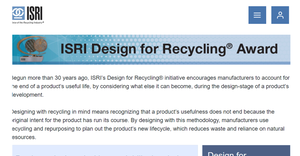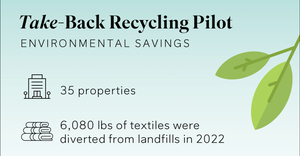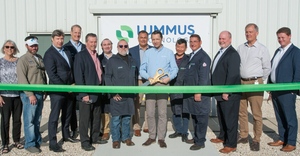April 23, 2020

After a year of progress, growth, and learning, Rethink Food Waste Through Economics and Data (ReFED) entered 2019 with momentum that hasn’t let up.
In the recently published 2019 Annual Report, ReFED highlights the year’s big wins, including the nonprofit Food Recovery Accelerator Program, what’s next in 2020, and what actions still need to be taken in order to achieve the national goal of reducing food waste by half by 2030.
2019 Highlights:
Achieved 501(c)(3) status, solidifying ReFED as an independent nonprofit
Hosted the 2019 Food Waste Summit
Released GHG Impact Methodology in collaboration with Ohio State University and Walmart
Hosted Innovator Excellence Day
Secured funding for the ReFED Insights Engine through a $2 million grant from The Kroger Co. Zero Hunger | Zero Waste Foundation
Launched the build of the ReFED Insights Engine
Launched ReFED’s new Stakeholder Engagement Structures including the new Advisory Council
One of ReFED’s biggest achievements in 2019, besides earning 501(c)(3) nonprofit status, was launching the ReFED Nonprofit Food Recovery Accelerator Program, said Dana Gunders, Executive Director of ReFED.
Supported by the Walmart Foundation and in partnership with +Acumen, the Accelerator “catalyzed ideas and accelerated solutions that will help food recovery organizations overcome some of the biggest barriers to increasing the amount of nutritious food available to the 40 million Americans facing food insecurity,” it said in the Annual Report.
Ten nonprofit organizations were selected out of 125 applications that all shared the same mission – improve the sustainability, equity, and dignity of the food system. According to the Annual Report, they were each given $30,000 of equity-free funding and access to the tools they needed to “test and implement mission-aligned earned revenue models and technology-enabled solutions using human-centered design to create a more dignified and convenient experience for end beneficiaries.”
Part of the program also included being connected with a 50-member expert network and a mentorship. Members of the expert network provided insightful interviews offering peer-to-peer learning about best practices on scaling impact and more.
Plentiful, a digital platform improving client dignity and efficiency at food pantries, received an additional $100,000 “because of the organization’s innovative offering and promising traction as a scalable concept.”
Since the conclusion of the Accelerator Program, Gunders said they are working on writing a practice report including an evaluation of the program.
“It wasn’t launched with the intention of being an annual occurrence,” she said. But part of the evaluation would include if the program should continue at all and if it did, would it be done in the same way or if it would be done in a different combination.
“A lot of pieces felt very successful,” said Gunders. “We feel like we really filled a niche that wasn’t happening before.”
While the Accelerator Program was in full affect in 2019, ReFED was also working toward launching the ReFED Insights Engine with a launch date of Fall 2020.
According to the Annual Report, “the ReFED Insights Engine will make it easy for all stakeholders to take action against food waste by providing continuously-updated food waste insights, tools, and data customized to their unique situations in one user-friendly online platform.”
The Engine’s innovative platform will feature a U.S. Food Waste Tracker, Food Waste Solutions Tool, Fact Sheets, a U.S. Food Waste Solution Provider Database, U.S. Food Waste Policy Tracker, U.S. Food Waste Investment Tracker, and a U.S. Food Waste Impact Calculator.
Gunders said it will provide a more robust characterization and granular estimate of how much food is going to waste, where it’s going to waste – geographically and within the supply chain – and why it’s going to waste.
The platform uses more than 50 public and proprietary data sets to identify the most effective and practical solutions that the sector should focus its efforts on implementing, according to the Annual Report.
For example, she said one solution is looking at artificial intelligence to help with forecasting for grocery stores by using data that helps identify patterns from the past to predict how much a store should purchase. The platform allows for data from all different factors to be considered like weather, promotions in stores and more.
Gunders, who took on the role of Executive Director in November, said it has been a wild ride, but she is excited for the launch later this year.
“The pandemic has certainly put a kink in things, but we expect at least a portion to launch late fall,” she said.
But launching the Insights Engine “in order to empower the country with the most comprehensive data center on food waste solutions” isn’t the only objective of 2020 to meet the goal of halving food waste by 2030.
“We will continue to accelerate innovation and attract capital to support it. And we will aim to enable our partners’ efforts as much as possible through community building at the 2020 Food Waste Summit,” Gunders said in the Annual Report. “The energy in this space is palpable. Now it’s time to put it to work and rewrite the script from awareness to action. There’s neither time nor food to waste.”
See the full 2019 ReFED Annual Report here.
Hear more from Dana Gunders in the free webinar, The Impact of COVID-19 on the Food Supply & Feeding the Hungry, on April 29, hosted by WasteExpo.
“The pandemic is having such an enormous impact on the food system. Everyday we’re seeing resourceful, innovative solutions and people willing to pitch in in all sorts of different ways. It’s been exciting to see,” said Gunders. “But there still is a massive challenge with tons of food going to waste. We’re only at the beginning of produce season here in the U.S. There will be a lot of food coming on line that won’t have a home. It will be a lot to deal with.”
You May Also Like


